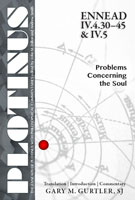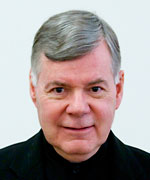
 |
PLOTINUS Ennead IV.4.30–
45
& IV.5:
Problems Concerning the Soul
Translation, with an Introduction, and Commentary
THE ENNEADS OF PLOTINUS
—WITH PHILOSOPHICAL COMMENTARIES
Series Edited by
John M. Dillon and Andrew Smith
April 2015
978–1–930972–69-8
376 pages • 5 x 7.5 • Paperback
$47.00
|
|
 Gary M. Gurtler, SJ Gary M. Gurtler, SJ
is Associate Professor of Philosophy at Boston College. He is co-editor of the Proceedings of the Boston Area Colloquium in Ancient Philosophy and president of the board of directors of the
International Society for Neoplatonic Studies. He is the author of Plotinus: The Experience of Unity (1988), as well as many notable articles on Plotinus, including “Plotinus: Matter and Otherness” (Epoché), “Plotinus: Self and Consciousness” (History of Platonism: Plato Redivivus), “Plotinus on the Soul’s Omnipresence in Body” (International Journal of the Platonic Tradition), and “Imitations of Beings Enter and Exit: Plotinus on Incorporeal Matter in Plato: III 6[26] 11–15” (Philosophy Study). |
|
|
|
|
Ennead IV.4.30–45 and IV.5 retrieves the unity in this last section of Plotinus’ treatise on Problems concerning the Soul. Combining translation with commentary, Gurtler enhances both the accuracy of the translation and the recovery of Plotinus’ often unsuspected originality. This is especially true for IV.5, where previous translations fail to convey the concise nature of his argument against both the Aristotelian and Platonic theories of vision.
Plato and Aristotle each claim that vision depends on the light between the eye and the object, but Plotinus presents evidence that this is not the case and develops a novel theory of light as a second activity that moves from source to object directly, even arguing that color is in the light itself rather than merely a quality of the object. This theory of vision, in turn, depends on the nature of sympathy developed especially in IV.4.30–45, where Plotinus shows how action at a distance is both possible and necessary for the proper unity in diversity of the sensible cosmos.
Plotinus was a Platonist, committed to expounding the doctrines put forward by Plato some seven centuries earlier. He was born and educated in Egypt, where he studied the teachings of Plato under the guidance of Ammonius Saccas. He came to Rome in 244 CE and built up a circle of followers devoted to studying Plato through Plato's own works and those of philosophers, both Platonist and non-Platonist, of the intervening centuries. From his fiftieth year Plotinus himself wrote down, in Greek, the findings of the seminars, and these writings were later edited by one of his pupils, Porphyry, and published in six groups of nine treatises entitled the Enneads (from the Greek word for nine – ennea).
|
|
 |
In this third and last part of ‘Problems Concerning the Soul’, Plotinus takes up three final problems or aporiai; insights from the first two parts are used to attack the popularly-credited influence of the planets on human enterprises, and the attendant problem of their memory and cooperation with evil. Confronted with the potentially reductionistic astronomy of Ptolemy and the medical lore of Galen, Plotinus complemented his Platonic sense of the cosmos as a single living thing (Timaeus 30d-31a) with the Stoic notion, notably compatible with a thorough-going materialism, of a ‘cosmic sympathy’ by which the cosmos is sympathetic with itself, and everything in it is sympathetic with everything else.
(Read the entire review here) |
—Patrick Madigan
Heythrop College |
|
| “Gary Gurtler has succeeded in the daunting task of translating Plotinus’ idiosyncratic and elliptical Greek into reasonably colloquial modern English. … This illuminating study is indispensable reading for anyone wanting to know how a Plotinian Soul, issuing from a higher realm, is able to adapt to a world of space and time dependent upon Soul, but not always responsive to her needs.” |
—Dr. Denis O’Brien
Centre for the Study of the Platonic Tradition
Trinity College, Dublin |
|
“In addition to an excellent commentary, Gurtler guides the reader through the maze of Plotinus’ writing with useful synopses and a clear and helpful
introduction to each chapter. He supplies the context of ancient science (medicine and astronomy) and ancient philosophy, as well as, where appropriate, analogies from contemporary thought, providing readers with a model of how to approach this difficult and rewarding author.”
|
—Frederic M. Schroeder
Professor Emeritus
Queen’s University, Ontario |
|
“Gurtler provides not only a work of expert translation and exegesis but the scope of the primary and secondary sources discussed are impressive. . . . The focus of [his] work is the problem of Plotinus’ combination of a monistic principle with the derivation of a pluralistic ontology in one coherent metaphysical system. Of particular interest is his analysis of Plotinus’ critique of Aristotle’s divine nous, the self-reflective structure of noesis noeseos. The author compels us to re-examine nous and the One within the history of ancient philosophy and beyond. [This] resonates not only with those concerned with debates among ancient Platonists and Aristotelians on what constitutes noesis but also those who currently work in philosophy of mind and epistemology of religion.”
|
—Robert M. Berchman
Director and Senior Scholar
Forum for Advanced Studies Gaetano Massa, Rome |
|
| “Gurtler admirably highlights the extent to which modern reductionist and mechanistic theories align with the astrological determinism that Plotinus is opposing, and to which his holistic and organismic cosmology offers a compelling alternative.” |
—Eric Perl
Professor of Philosophy
Loyola Marymount University |
|
“Examining both the sympathy of the cosmos from its highest to lowest levels as well as the technical manifestation of soul in the material human body, Gurtler locates Plotinus’ treatment of soul as drawing on and responding to the most advanced science, psychology, astronomy, and astrology of his day. … This volume will be an essential reference for those doing future work on Plotinus’ account of the soul and its activities.” |
—Gary Gabor
Assistant Professor of Philosophy
Hamline University |
|
|
|
|
|

